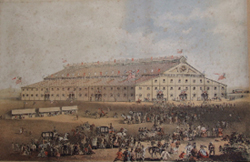|
|
American Irish Musical Interpreters,
1850 - 1975
Patrick Sarsfield Gilmore,
1829-1892:
Father of the American Concert Band
 The most important bandleader before John Philip Sousa, P.S. Gilmore was born in 1829
and spent his youth in Ballygar, County Galway, Ireland.
After immigrating to Boston in 1849, P.S. Gilmore rose
to prominence as a bandmaster, concert organizer, and
composer, becoming one of the premier American musical figures
of the 19th century. The most important bandleader before John Philip Sousa, P.S. Gilmore was born in 1829
and spent his youth in Ballygar, County Galway, Ireland.
After immigrating to Boston in 1849, P.S. Gilmore rose
to prominence as a bandmaster, concert organizer, and
composer, becoming one of the premier American musical figures
of the 19th century.
P.S. Gilmore was inspired by the musical precision of
British army bands he had heard in Ireland, where he learned
to play the E-flat cornet from the bandleader Patrick
Keating. P.S. Gilmore quickly established himself in Boston
as an outstanding soloist, and led the Boston Brigade
Band and the Salem Brass Band. As a bandleader, he undertook
a succession of ambitious projects, guiding his bands
in innovative musical directions.
P.S. Gilmore helped reshape the traditional military
brass band into a civilian performing entity, incorporating
woodwinds and performing orchestral repertoire. During
the Civil War, his band accompanied the 24th Massachusetts
Regiment to the front. His wartime compositions included
"When Johnny Comes Marching Home," inspired
in part by "Johnny We Hardly Knew Ye,” an Irish
anti-war marching song.
His grand 1864 concert for the inauguration of the Louisiana
governor inspired P.S. Gilmore to create the 1869 National
Peace Jubilee, near what is now Copley Plaza in Boston.
A 30,000 seat coliseum was specially built for the event.
 Gilmore’s 1872 World Peace Jubilee in Boston seated
50,000, marking the end of the Franco-Prussian War and
featuring premier European ensembles, including the American
debut of “waltz king” Johann Strauss and his
orchestra. Gilmore’s 1872 World Peace Jubilee in Boston seated
50,000, marking the end of the Franco-Prussian War and
featuring premier European ensembles, including the American
debut of “waltz king” Johann Strauss and his
orchestra.
Several popular traditions we enjoy today began with
P.S. Gilmore and his band, such as the Fourth of July
concerts on the Boston Common. In 1873, P.S. Gilmore became
leader of the 22nd New York Regiment Band, and it is his
band that began the practice of greeting the New Year
in Times Square. On land leased from P.T. Barnum, he established
Gilmore's Garden, later named Madison Square Garden.
In 1891, Gilmore and his band made a few commercial recordings
for Thomas Edison, and the recordings proved so popular
that the band continued recording for many years after
Gilmore’s death in 1892.
 For more information on P.S. Gilmore, see the select bibliography created for this exhibit. For more information on P.S. Gilmore, see the select bibliography created for this exhibit.
|
